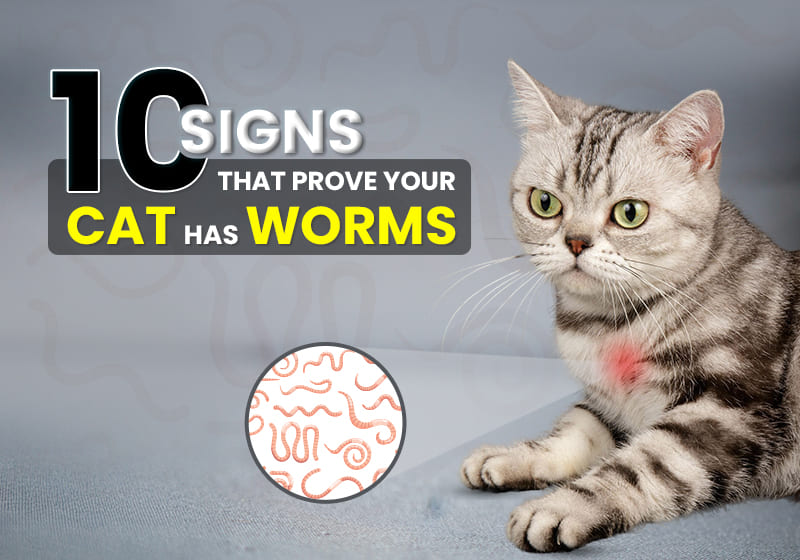
Cats of all breeds and sizes are vulnerable to intestinal worm infestations. These worms are common internal parasites that live inside your kitty’s body, causing discomfort and damage to their organs. As cat parents, discovering intestinal worm infestations in your cat can be quite disturbing and upsetting. However, with the help of timely detection and relevant treatment, the pesky parasites can be put to rest. If you are new to cat parenthood and not sure how to detect worm infestations, do not worry, as we are here to help. In this blog, we will shed light on the common signs that indicate that your cat has worms. Let’s get started.
Symptoms of Worm Infestations in Cats
Cats are commonly infested by intestinal worms like roundworms, hookworms, whipworms and tapeworms. Below are the common symptoms of worm infestations in cats:
- Diarrhea or Soft Stool
Soft stool or diarrhea is one of the most common symptoms of intestinal worm infestations in cats. Worms such as roundworms, tapeworms and hookworms cause damage to the cat’s intestinal lining, leading to inflammation and nutrient malabsorption. The irritation commonly results in watery stools.
- Vomiting
Cats infested with roundworms often experience vomiting. You may also spot roundworms in their vomit, which are large in size and easily visible to the naked eye.
Also Read: Vomiting in Cats – Causes & Treatment
- Pot-bellied (distended) Abdomen
A pot-bellied (distended) abdomen is one of the most recognizable symptoms of heavy worm infestation in cats. It is the burden of the worms in the intestines that causes visible distention or swelling of the abdomen. It also makes the belly appear rounded and sometimes hardened on palpation.
- Weight Loss
Weight loss is a significant symptom of worm infestation in cats. Worms stay in your cat’s intestines and feed on its ingested food and nutrients, depriving the cat of its food. Therefore, if you notice that your cat is losing considerable weight despite consuming a normal quantity of food, it’s time to watch out for worm infestations.
- Unhappy Appearance & Dull Coat
If your cat displays an unhappy appearance with a dull coat, it can be because of malnutrition and poor health caused by worm infestations. This happens when worms living in your cat’s intestine interfere with the nutrient absorption, leading to a dull, dry and coarse fur coat.The nutrient depletion also affects the cat’s skin and its overall condition, leading to excessive shedding, dandruff, or hair loss, contributing to an unhealthy and miserable appearance.
- Pale Gums
Cats experience pale gums when infested with hookworms. The blood-feeding parasites attach to the intestinal lining of the cat, causing significant blood loss. This results in a reduction of the number of red blood cells, leading to anemia and pale gums.
- Coughing or Troubled Breathing
If your cat is coughing profusely or having trouble breathing, it can indicate a serious worm infection caused by lungworms, heartworms or roundworms. In such cases, it is advisable that you get it checked by a vet.
- Lack of Energy
If your cat seems to experience a significant lack of energy, it can be because of worm infestations. The tiny organisms feed on your cat’s food and blood, depriving them of the required nutrition. This leads to them suffering from fatigue and a lack of energy.
- Scooting or Itching
Scooting (dragging the rear on the ground) or itching around the anal area can be a symptom of worm infestation in cats. However, scooting is not always caused by worms. Sometimes, reasons like anal gland problems, litter stuck to the fur or skin irritation can cause this behavior.
- Worms Around the Anus
If your kitty is infested with tapeworms, their eggs will cluster in the fur around its anus. Therefore, if you happen to spot creamy-white substance resembling sesame seeds clinging to its fur, it can be a cause of tapeworm infestations.
Wrapping Up
Recognizing the signs of worm infestation in cats is highly important to ensure their health and well-being. Early detection and timely diagnosis are highly important and will help in effective treatment before it’s too late. Always remember that regular deworming and preventive care are essential to keep worms at bay and ensure your cat’s comfort and safety.
At BestVetCare, we carry a wide range of wormers for cats, including Profender for Cats, Drontal for Cats, Milbemax for cats, etc., at the best prices. Check out our online store to enjoy unbeatable offers on your favorite cat treatments from the comfort of your home.
